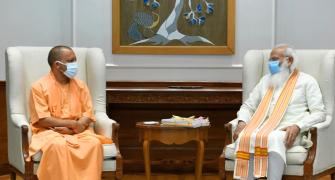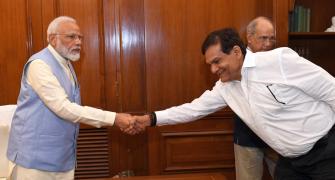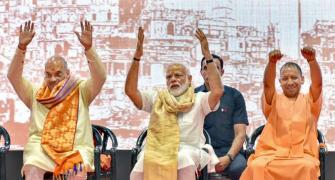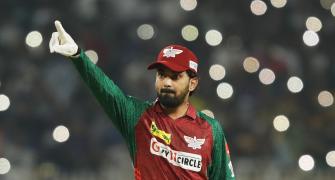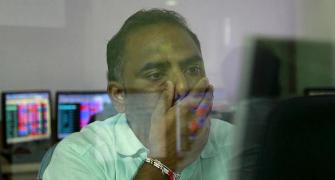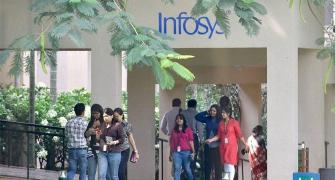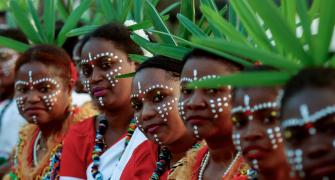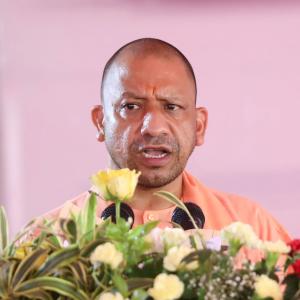Khushi Dubey, Hari Shankar Tiwari and Mata Prasad Pandey represent the resentment among Brahmins towards the Adityanath government. Radhika Ramaseshan reports.
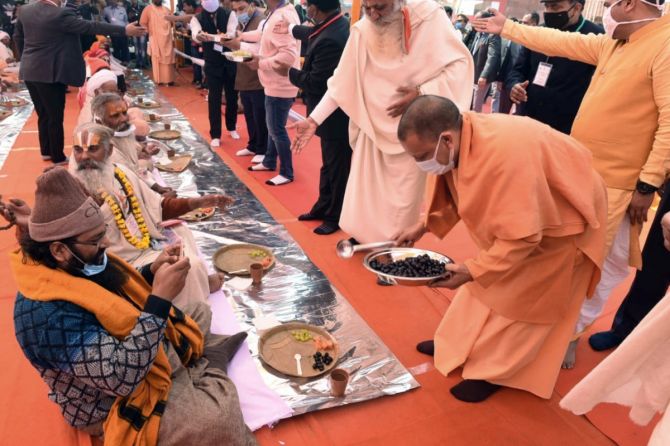
For the last two years in Uttar Pradesh, the palpable unrest among Brahmins, caused by certain policies and moves of the Yogi Adityanath government, manifested itself in religious symbols and iconography.
The scrapping of a public holiday on “Parashuram Jayanti” was resented by Brahmin leaders of the Bharatiya Janata Party and seized upon by the Opposition to stoke the community’s sentiment.
Mythicised as the sixth incarnation of Vishnu, Parashuram, a lesser-known figure in the Hindu pantheon, was embraced by the heartland Brahmins because he denoted a muscular quality that took shape when he annihilated the Kshatriyas 21 times to avenge the killing of his father by a Kshatriya king, according to lore.
But caste unrest also needs a contemporary context and living names and faces to raise the undercurrents and bring them into political discourse and amplify the import. The personas of Khushi Dubey and to a smaller degree, of Hari Shankar Tiwari and Mata Prasad Pandey came in useful. The trio has nothing in common except for being Brahmins.
Khushi, 26, is the wife of Amar Dubey, an associate of Vikas Dubey, the infamous gangster who shot dead eight cops who came to arrest him in July 2020 from his home at Bikru village near Kanpur.
Amar was slain in a police encounter at Hamirpur shortly thereafter; Khushi, who he had wed only a week ago, was arrested and jailed. She is in prison although the charge against her as a co-conspirator in the cops’ massacre has not been nailed.
Various lobbies, including the All India Brahman Mahasabha, headed by Umesh Dwivedi, a BJP legislative council member, petitioned the chief minister to secure Khushi’s release.
“Khushi has become the rallying point of anger among Brahmins, especially women. A Kanpur police officer admitted she was wrongfully framed but he was promptly transferred,” alleged Abhishek Mishra, national secretary of the Samajwadi Party (SP), who was assigned the charge of the SP’s Brahmin outreach.
Hari Shankar Tiwari, an octogenarian from the Gorakhpur region who earned a place for himself in UP’s politics as a Brahmin who never thought twice of physically confronting the Rajputs, was an early “victim” of the Adityanath regime.
The home of the former Congressman, who’s now with the Bahujan Samaj Party (BSP), was raided because Tiwari had taken on the chief minister’s mentor, Mahant Avaidyanath, in the distant past.
Mata Prasad Pandey, 79, former assembly speaker and member of the SP, was assaulted at Siddharathnagar during the recent panchayat polls. “The reactions come from a perception point but they are all caste-related,” said the SP’s Mishra.
“The churn among Brahmins is too evident to be ignored. Brahmins can co-exist with Kayasthas, the backward castes and Dalits but they will not take oppression and injustice from Rajputs and that’s what is happening in UP. Under Adityanath, Rajputs have challenged the Brahmin supremacy. Mayawati and Akhilesh Yadav (BSP and SP presidents) may work for the castes they represent but they will never harm Brahmins,” a Lucknow-based political observer noted.
Veteran UP editor Gyanendra Sharma said: “The chief minister is clearly inclined towards Rajputs as a result of which the age-old Brahmin social fabric is wearing out for the first time.”
A UP BJP office-bearer’s take on why the Brahmin voters were significant was, “Brahmins are not merely voters. They are supporters, reporters and promoters. In every constituency, they are force multipliers. When a Brahmin speaks at a village courtyard, he has everyone else’s ears and minds.”
Since 1990 -- when the National Front-Left Front government declared it would provide 27 per cent reservations for the socially and educationally backward classes for jobs in government and public sector -- Brahmins reacted en masse politically by switching their allegiance from the Congress to the BJP in UP.
Despite the BJP’s clear tilt towards the backward castes, they remained wed to it except when they supported the BSP in 2007 and the SP in 2012, the latter to a lesser extent.
In 2017, as many as 58 Brahmins were elected from the BJP after an estimated 82 per cent voted the party.
“In just 15 months after the BJP was elected, complaints began pouring in. Nobody would listen to the community in police stations and government offices; bribes were openly solicited and targeted killings became frequent,” said Mishra.
The SP was the first to spot Brahmin support for the BJP slipping through the cracks. From promising to restore a public holiday to commemorate Parashuram and raising his statue, the SP began to network with Brahmin organisations and leaders through Mishra, the party’s Brahmin MLAs and Annu Tandon, the former Unnao MP who left the Congress to join the SP.
The outcome of this phase of the outreach was the SP will host a prabuddh sammelan (intellectual meet) at Ballia on August 24, followed by other such meetings.
“The idea is to soften the impression that we are a party of criminals. We have to strike a chord with a thinking community that principally shapes opinions everywhere,” an SP source said.
Likewise, the BSP started by playing on Parashuram and went on to recently convene a Brahmin conclave at Ayodhya in which Satish Mishra, general secretary and the party’s Savarna face, proclaimed if elected, the BSP government will speed up the Ram temple’s construction.
Paresh Mishra, who helms the BSP’s IT cell, said: “Our message will be giving Brahmins a share of the ticket in proportion to their population (an estimated 12 per cent) and making them feel secure.”
Devmani Dwivedi, a former police officer and a BJP legislator from Lambhua (Sultanpur), was optimistic that Brahmins will not desert his party.
“Their minds have turned sour but not bitter. We can still salvage the roots,” he said.
Shrikant Sharma, UP’s power minister and the government’s spokesperson, said: “Our work is our counter-strategy. It speaks for itself. Caste is a reality but the answer to it is our politics of vikas (development) which transcends casteism.”


